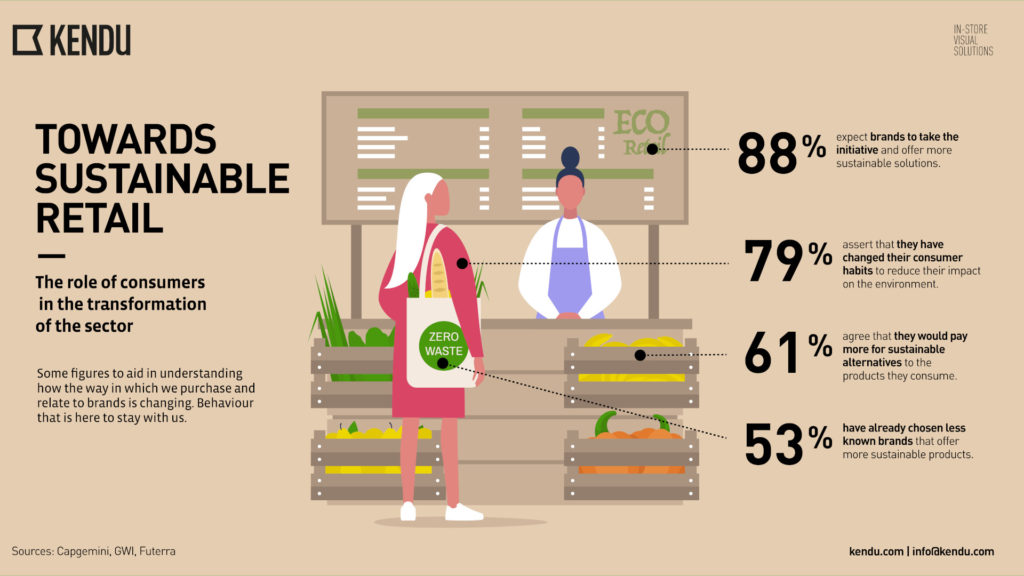SUSTAINABLE RETAIL: WHAT ROLE DO CONSUMERS PLAY?
In recent years numerous retail brands have chosen to change the way they do business in order to reduce their environmental impact as much as possible. Cases like that of Nespresso, with its AAA Sustainable Quality Programme, and Timberland, with the Nature Needs Heroes initiative, are two clear examples of how major international brands are starting to include sustainable initiatives in their value proposals.
What role do consumers play in the transformation of retail? Each day, more and more people are developing an awareness of sustainability, taking on greater responsibility in assessing the impact of their purchasing habits, analysing what is behind each brand, and placing more importance than ever on the ‘eco’ factor in their decision-making and purchases of new products and services.
Take a look at the infographic we have created, in which we compile some key data to better understand how consumers are changing the way they purchase and relate to brands. Without a doubt, sustainable retail is here to stay!

Now more than ever, the consumer’s role is crucial in the transformation being seen in the sector. Let’s take a closer look and analyse each of the four figures we have laid out in the infographic:
8 out of 10 are changing their habits
According to a study by the Capgemini Research Institute, 79% of consumers admit that they are changing their purchasing preferences in order to reduce the impact of their consumption, and also based on social responsibility and inclusiveness. The COVID-19 health crisis has led to a greater awareness about the scarcity of natural resources in the “new normal”.
More consumers are choosing eco brands
The same study also concluded that 5 out of 10 consumers (53%) are looking for sustainable alternatives to the better-known products, often purchasing brands that they were unaware of up to that time. This behaviour becomes even more prevalent among younger generations, reaching 57% in the 18 to 24 age group. Everything indicates that this trend will continue to increase over the years, and major brands will need to bear this in mind in order to keep up.

(Almost) Everyone is expecting more from brands
In 2018 the creative agency Futerra launched a survey in which 88% of the respondents asserted that they expect greater support from brands to be more environmentally friendly. Consumers agree: brands must go one step further to talk not only about how they are handling the challenge of reducing the impact of their business but also focusing on how they can help others be more sustainable.
61% of Millennials would pay more
According to GlobalWebIndex, 6 out of 10 Millennials would be willing to pay more for eco-friendly or sustainable products. The youngest audience is once again key in the sustainable transformation of retail, exceeding the percentage of Baby Boomers who would agree to pay more money for sustainable products by 15 points.

How can we at Kendu help?
At Kendu we strive to help our customers become more sustainable each day, working to develop new eco-designed products and reducing our CO2 emissions. We promote the circular economy of our products, reducing to a minimum the amount of waste generated because we are aware of how important waste management is, and we reuse part of our waste, partnering with local entities on projects in which they are converted into materials for training programmes.
We also work actively in programmes aimed at reusing our textile waste as a component in the creation of new products, programmes offered to our customers as an alternative to recycling textiles from campaigns when they are finished. In terms of transportation, we endeavour to significantly reduce the packaging for our solutions, thus also reducing the amount of CO2 given off during transport to the end customer.
Tackling, embracing and being committed to sustainability is and will remain a MUST not only for Kendu but also for every company committed to sustainable growth.
ECO Solutions
Kendu employs continuous improvement to provide retailers with eco-friendly materials and products.




